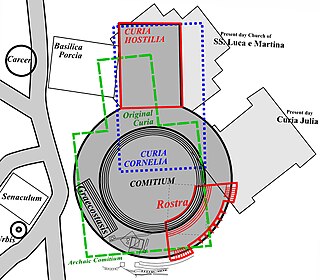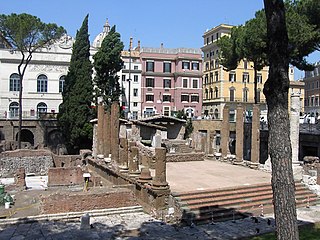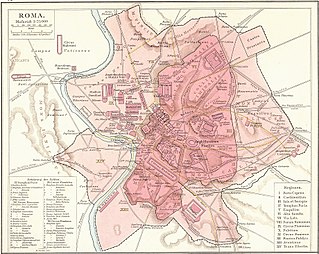
The Bacchanalia were Roman festivals of Bacchus based on various ecstatic elements of the Greek Dionysia. They seem to have been popular and well-organised throughout the central and southern Italian peninsula. They were almost certainly associated with Rome's native cult Liberalia which is dedicated to Liber and spouse Libera, also known as Proserpina. The cult probably arrived in Rome itself around 200 BC. However, like all Greco-Roman mysteries very little is known of their rites. Once the Bacchanalia had become popular, The Roman Senate was threatened by the Bacchanalia because they believed it was designed to rebel against their political views, thus wanted to suppress the mystery cult to avoid any kind of rebellion against the Senate.

The Curia Hostilia was one of the original senate houses or "curiae" of the Roman Republic. It was believed to have begun as a temple where the warring tribes laid down their arms during the reign of Romulus. During the early monarchy, the temple was used by senators acting as council to the king. Tullus Hostilius was believed to have replaced the original structure after fire destroyed the converted temple. It may have held historic significance as the location of an Etruscan mundus and altar. The Lapis Niger, a series of large black marble slabs, was placed over the altar where a series of monuments was found opposite the Rostra. This curia was enlarged in 80 BC by Lucius Cornelius Sulla during his renovations of the comitium. That building burned down in 53 BC when the supporters of the murdered Publius Clodius Pulcher used it as a pyre to cremate his body.
Decimus Junius Brutus Albinus was a Roman general and politician of the late republican period and one of the leading instigators of Julius Caesar's assassination. He had previously been an important supporter of Caesar in the Gallic Wars and in the civil war against Pompey. Decimus Brutus is not to be confused with his distant cousin and fellow conspirator Marcus Junius Brutus, though he often is.

The rostra was a large platform built in the city of Rome that stood during the republican and imperial periods. Speakers would stand on the rostra and face the north side of the comitium towards the senate house and deliver orations to those assembled in between. It is often referred to as a suggestus or tribunal, the first form of which dates back to the Roman Kingdom, the Vulcanal.

Gaius Lutatius Catulus was a Roman statesman and naval commander in the First Punic War. He was born a member of the plebeian gens Lutatius. His cognomen "Catulus" means "puppy". There are no historical records of his life prior to consulship, but his career probably followed the standard cursus honorum, beginning with service in the cavalry and continuing with the positions of military tribune and quaestor.

In ancient Roman religion, the Flamen Martialis was the high priest of the official state cult of Mars, the god of war. He was one of the flamines maiores, the three high priests who were the most important of the fifteen flamens. The Flamen Martialis would have led public rites on the days sacred to Mars. Among his duties was the ritual brandishing of the sacred spears of Mars when the Roman army was preparing for war.
Quintus Pleminius was a propraetor in 205 BC. He was given command over Locri in Bruttium by Scipio Africanus after its recapture, considered the "outstanding event" in Sicilian operations that year. His governorship, if it should be called that, ended in sacrilege and murder.
Quintus Fulvius Flaccus was a plebeian consul of the Roman Republic in 179 BC. Because of his successes in Spain and Liguria, he celebrated two triumphs. Although his political career was a success, he was plagued by controversy and suffered a mental breakdown that culminated in suicide.

The Comitium was the original open-air public meeting space of Ancient Rome, and had major religious and prophetic significance. The name comes from the Latin word for "assembly". The Comitium location at the northwest corner of the Roman Forum was later lost in the city's growth and development, but was rediscovered and excavated by archeologists at the turn of the twentieth century. Some of Rome's earliest monuments; including the speaking platform known as the Rostra, the Column Maenia, the Graecostasis and the Tabula valeria were part of or associated with the Comitium.
Lucius Postumius Albinus was a Roman politician and general of the 3rd century BC who was elected consul three times. Most of our knowledge about his career and his demise comes from Livy's Ab Urbe Condita.
Spurius Postumius Albinus was a politician of Ancient Rome, of patrician rank, of the 2nd century BC. He was praetor peregrinus in 189 BC, responsible for Roman interests in foreign affairs; and consul in 186 BC. In his consulship the Senatus consultum de Bacchanalibus was passed, reforming the mystery cult of Bacchus in Rome and among her close allies on the Italian mainland. In Livy's account, this was a reaction to various abominable crimes committed by members of the cult, and its threat to the Roman state. More likely, the legislation represents an attempt by Postumius and the senate to impose traditional Roman values and collective authority over a well organised, unofficial civil and religious association that seemed dangerously popular, widespread and potentially subversive. The legislation followed close after a particularly traumatic and turbulent period in Rome's history; Postumius was also an augur, which gave him a degree of religious authority. He died in 179 BC at an advanced age.
Spurius Postumius Albinus Paullulus was a politician of ancient Rome, of patrician rank, of the 2nd century BC. He was praetor in Sicily in 183 BC, and consul in 174 BC. He was probably a brother of Aulus Postumius Albinus Luscus and Lucius Postumius Albinus, and perhaps obtained the agnomen of "Paullulus" by being small of stature, to distinguish him more accurately from his two brothers.

The Tribal Assembly was an assembly consisting of all Roman citizens convened by tribes (tribus).

The Shrine of Vulcan, or Vulcanal, or Volcanal, was an 8th-century BC sacred precinct on the future site of the Roman Forum in Rome, modern Italy. Dedicated to Vulcan, the Roman god of fire, it was traditionally considered to commemorate the spot where the legendary figures Romulus and Tatius concluded the peace treaty between the tribes known as the Latins — on the Palatine Hill — and the Sabines — on the Quirinal and Esquiline. This famous merger of the hill-villages was said to be the foundation of the Roman state.

Gaius Sextius Calvinus was a consul of the Roman Republic in 124 BC. During his consulship, he joined M. Fulvius Flaccus in waging war against the Ligures, Saluvii, and Vocontii in the Mediterranean region of present-day France. He continued as proconsul in Gaul for 123–122. He had held office as praetor no later than 127.

In the constitution of ancient Rome, prorogatio was the extension of a commander's imperium beyond the one-year term of his magistracy, usually that of consul or praetor. Prorogatio developed as a legal procedure in response to Roman expansionism and militarization; the number of annexed territories and theaters of operations outgrew the number of elected officials available to take on military and administrative duties.
Marcus Baebius Tamphilus was a consul of the Roman Republic in 181 BC along with P. Cornelius Cethegus. Baebius is credited with reform legislation pertaining to campaigns for political offices and electoral bribery (ambitus). The Lex Baebia was the first bribery law in Rome and had long-term impact on Roman administrative practices in the provinces.

The gens Postumia was an ancient and noble Patrician family at Rome. Throughout the history of the Republic, the Postumii frequently occupied the chief magistracies of the Roman state, beginning with Publius Postumius Tubertus, consul in 505 BC, the fifth year of the Republic. Although like much of the old Roman aristocracy, the Postumii faded for a time into obscurity under the Empire, individuals bearing the name of Postumius again filled a number of important offices from the second century AD to the end of the Western Empire.

The gens Plaetoria was a plebeian family at Rome. A number of Plaetorii appear in history during the first and second centuries BC, but none of this gens ever obtained the consulship. Several Plaetorii issued denarii from the late 70s into the 40s, of which one of the best known alludes to the assassination of Caesar on the Ides of March, since one of the Plaetorii was a partisan of Pompeius during the Civil War.
In Roman law during the Republic, calumnia was the willful bringing of a false accusation, that is, malicious prosecution. The English word "calumny" derives from the Latin.











